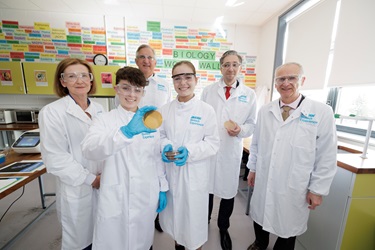Leukaemia Researcher Jonathan Bond Joins SBI as UCD 'Brendan McGonnell' Professor of Paediatric Molecular Haemato-Oncology
Leukaemia is the most common form of childhood cancer and was universally fatal until the mid-twentieth century. The outlook has improved enormously over the last few decades, and children in the developed world now have 85-90% overall cure rates. However, there is still a lot of room for improvement. Some patients will have relapse of their leukaemia that is difficult to eradicate. Current therapies can occasionally have severe long-term side-effects, particularly in older children and adolescents. Better treatment approaches are therefore urgently needed.
Professor Jonathan Bond has recently started at SBI as the UCD Brendan Mc Gonnell Professor of Paediatric Molecular Haemato-Oncology. This new position is the result of a collaboration between UCD and the National Children’s Research Centre (NCRC) and is supported through the NCRC Research Leadership Award Scheme by a significant legacy donation from the late businessman and philanthropist Brendan Mc Gonnell to the Children’s Medical and Research Foundation (CMRF Crumlin). In addition to teaching roles at UCD medical school and Our Lady’s Children’s Hospital, Crumlin (OLCHC), Prof Bond will be carrying out research into childhood and adolescent leukaemias at SBI.
“The NCRC Research Leadership Award Scheme aims to build research capacity in key areas of child health, and this new Chair at UCD will play a pivotal role in the development of a molecular and translational research programme into childhood blood cancers,” said Dr Jacinta Kelly, Chief Executive of the NCRC.
A native of Dublin, Prof Bond trained as a clinical paediatric haematologist in Ireland, before deciding to investigate how normal gene regulation gets subverted in acute leukaemia. After working at UCL Institute of Child Health and Great Ormond Street Hospital, he did a PhD thesis in B-lymphoid transcriptional regulation in the laboratory of UCD alumnus Niall Dillon at the MRC Clinical Research Centre (now London Institute of Medical Sciences). He spent the last five years in Elizabeth Macintyre’s group at Hôpital Necker-Enfants Malades in Paris, where he developed interests in both immature T-ALL and AML.
Prof Owen Smith CBE, Professor of Paediatric and Adolescent Medicine, UCD School of Medicine said, “We are sincerely grateful to the NCRC and CMRF for their commitment to further research into paediatric blood cancers at University College Dublin which is a truly fitting gesture in memory of Brendan McGonnell and his extraordinary philanthropy.”
Prof Smith added, “We are delighted to welcome Professor Bond to the University, where he will be a significant asset to our research activities in paediatric haemato-oncology. His appointment will have a major impact in the field of paediatric cancer in Ireland and internationally.”
The huge complexity of altered gene and protein expression in acute leukaemia make it a logical target for systems biology-based investigations, where patterns of multiple changes in cancer cells are identified using computer models. But these approaches have so far not been widely used in leukaemia research. Prof Bond’s work will aim to identify the molecular mechanisms of ‘developmental block’ that drives leukemia, whereby immature immune cells are produced in excessive numbers but are impeded from developing fully, and the molecular mechanisms of treatment resistance, particularly in high-risk leukaemia subgroups. His research will centre on real clinical problems encountered by patients at Our Lady’s Children’s Hospital Crumlin (OLCHC), with the ultimate aim of improving outcomes for all children and adolescents with leukaemia. His work is very well suited to the research environment in SBI, with the common themes of systems biology and cancer research.
Prof Bond said, “I am very grateful that NCRC, CMRF and UCD have used Brendan McGonnell’s generous donation to create this position. This is a hugely exciting opportunity to perform research that will improve the treatment of children with blood cancers.”
Prof Bond is currently establishing his research group within SBI. Students or postdocs interested in his work can contact him on jonathan.bond@ucd.ie and read a selection of his papers at the links below.
Haematologica 2016;101(6):732-40;

